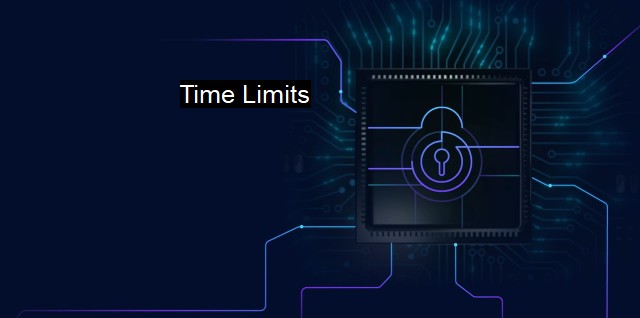What are Time Limits?
Importance of Time Limits in Antivirus Software for Efficient and Reactive Cybersecurity Measures
Time limits is an essential concept that refers to the specific durations of time within which certain actions related to systems security should be executed. This could include several elements within an antivirus or a cybersecurity system - such as scanning for threats, patching identified vulnerabilities, or updating the antivirus software. Such specific periods are referred to as ‘time limits,’ essential for efficient functioning and dependable performance of an antivirus software.The effectiveness of antivirus or cybersecurity protocols can be directly limited by the passage of time. As time unfurls, new, innovative, and more aggressive forms of cyber-attacks come into existence. This evolution is rapid, and the defenses against them must evolve at a similar pace or even faster. To adapt to the evolving threats, continuous antivirus software updates are needed. The periodic deployment of updates within a set time limit eradicates the risks posed by these new threats.
While most software systems automatically administer updates, it is paramount to set time limits or deadlines to these updates, as incremental delays can create open windows for the threats to permeate the defenses. Organizations must therefore set strict time limits regarding updates, mandating their systems to complete these updates within set durations to minimize risk.
Another scenario involving time limits in cybersecurity touches on incident response following a discovered security threat. Swift intervention within defined time limits ejects the threat and restricts access, protecting crucial system data. A fast response time can result in significantly reduced damages, making the difference between a minor incident and a major cybersecurity catastrophe.
A common practice in cybersecurity involves implementing time limits on user sessions to defend against unauthorized access to critical information. This is particularly important when information is accessed remotely or via public networks where the risk of eavesdropping is high. By placing a time limit on the duration of an individual session, the security protocol reduces the window of opportunity that a cyber-attacker could exploit to initiate and complete an attack.
Antivirus vendors often use time limits related to their product’s licenses as part of their business model. Offering unparalleled security features for set durations helps maintain a flow of income and enables users to have access to latest feature updates and virus definitions. If the licensed security product expires, potentially hazardous elements may infiltrate the security systems, leading to crippling damages.
Time limits are also applied at the user end to prompt swift action regarding malware-infected files. Whenever an antivirus detects contaminated files, it isolates them in quarantine and shared with the device owner through notifications. Through this, the antivirus sets an unspoken "time limit" for the user to remediate or delete these files before further infection can transpire.
Lastly, penetration testing – a practice wherein cybersecurity professionals deliberately test a system's defenses against cyber-attacks – often completes under a strict timeframe. Conducting such assessments within a time frame marks a scenario mirroring real-world attacks and helps determine the robustness of the antivirus software.
Time limits play an incredibly vital role in cybersecurity and antivirus arenas while navigating the tireless efforts against digital threats. Whether that’s designated timeframes for systems to respond to potential threats or fixed durations of antivirus license, imposing time limits in the realm of cybersecurity and antivirus measures ensures optimal defense, maintain system integrity, minimizes risk and potential damage.

Time Limits FAQs
What is a time limit in the context of cybersecurity and antivirus?
A time limit is a specific duration of time set for an antivirus software to complete a certain action, such as scanning or updating virus definitions.Why are time limits important in antivirus software?
Time limits are essential to ensure that the antivirus software performs optimally and does not affect system performance by running indefinitely. It also helps ensure that the software stays up-to-date with the latest virus definitions and protection protocols.What happens if an antivirus software exceeds its time limit?
If the antivirus software exceeds its time limit, it may not complete its intended task, leaving the system vulnerable to potential threats. In some cases, the software may crash or cause other performance issues.Can time limits be adjusted in antivirus software?
Yes, most antivirus software allows users to adjust time limits to suit their particular needs and preferences. This can include adjusting the frequency of updates or scheduling scans to run at specific times.| | A | | | B | | | C | | | D | | | E | | | F | | | G | | | H | | | I | | | J | | | K | | | L | | | M | |
| | N | | | O | | | P | | | Q | | | R | | | S | | | T | | | U | | | V | | | W | | | X | | | Y | | | Z | |
| | 1 | | | 2 | | | 3 | | | 4 | | | 7 | | | 8 | | |||||||